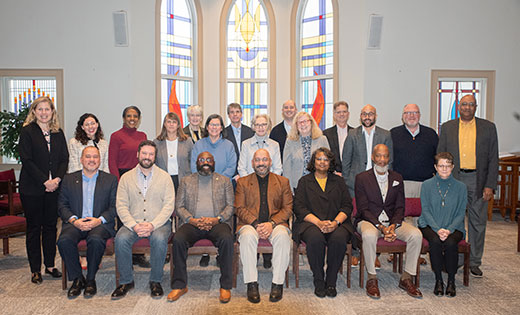Presbyterian Church (U.S.A.) seminaries commit to working collaboratively in educating students for the church and beyond
 Pittsburgh Theological Seminary President and Professor of Theological Formation the Rev. Dr. Asa J. Lee joined with presidents, board chairs, and academic deans of the other Presbyterian Church (U.S.A.) seminaries for three days in January to discuss the future of theological education.
Pittsburgh Theological Seminary President and Professor of Theological Formation the Rev. Dr. Asa J. Lee joined with presidents, board chairs, and academic deans of the other Presbyterian Church (U.S.A.) seminaries for three days in January to discuss the future of theological education.
During their gathering at Columbia Theological Seminary in Decatur, Ga., Jan. 11-13, 2024, the group committed to reimagining how the denominational seminaries can see their work as complimentary and not competitively. To that end, the sister schools represented at the meeting released this joint statement:
“Rapidly changing trends in theological education are sparking a fresh spirit of creativity as PC(USA) seminaries enact their distinctive and shared mission and vision. Working from common ground toward a common good, seminary leaders are reimagining, innovating, and collaborating in new ways to embody our connectional values, to reform our approaches to Reformed theological education, and to equip and resource laity and clergy in a church and world in a season of renewal.”
President Lee said: “This commitment to serve the Christian church and the Reformed tradition is a pathway to vocational renewal for all of us. Our collective hope is to address the needs of the present and future students who will serve communities around the world.”
While each of the seminaries who gathered are represented on the Committee On Theological Education (COTE), this gathering was called by the PC(USA) presidents who have often come together historically as a collegial and collaborative group. These schools include the following:
- Auburn Theological Seminary | New York, N.Y.
- Austin Presbyterian Theological Seminary | Austin, Texas
- Columbia Theological Seminary | Decatur, Ga.
- Johnson C. Smith Theological Seminary | Atlanta, Ga.
- Louisville Presbyterian Theological Seminary | Louisville, Ky.
- McCormick Theological Seminary | Chicago, Ill.
- Pittsburgh Theological Seminary | Pittsburgh, Pa.
- Princeton Theological Seminary | Princeton, N.J.
- San Francisco Theological Seminary | San Anselmo, Calif.
- Evangelical Seminary of Puerto Rico | San Juan, P.R.
- Union Presbyterian Seminary | Richmond, Virginia and Charlotte, N.C.
- University of Dubuque Theological Seminary | Dubuque, Iowa
The presidents have committed to regularly gathering throughout the year to discuss the progress of the work of this shared commitment. The broader group of presidents, board chairs, and academic deans will reconvene in 2025 at Union Presbyterian Seminary to continue imaging how their shared work can best prepare students for ministry, provide continuing education for ordained and lay leaders, and create centers for theological discourse, reflection, and research for the benefit of the wider church during changing times.
